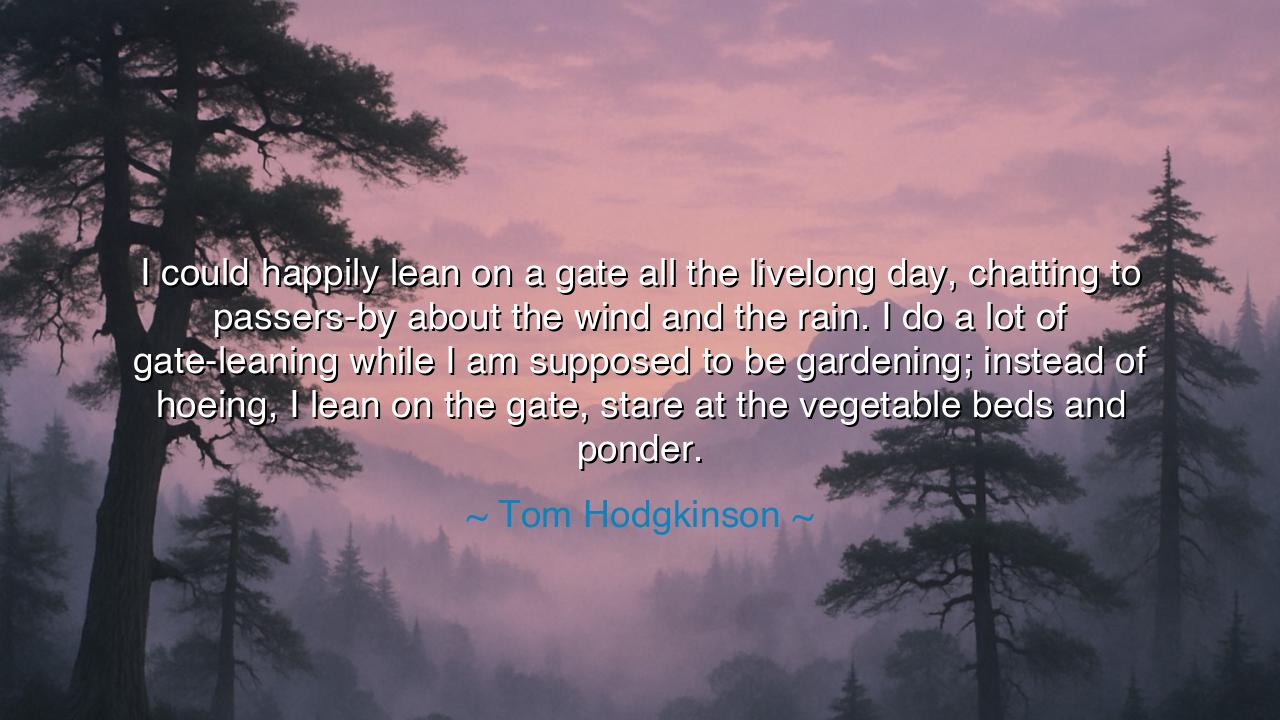
I could happily lean on a gate all the livelong day, chatting to
I could happily lean on a gate all the livelong day, chatting to passers-by about the wind and the rain. I do a lot of gate-leaning while I am supposed to be gardening; instead of hoeing, I lean on the gate, stare at the vegetable beds and ponder.






Hear now, children of stillness and motion, the words of Tom Hodgkinson, who said, “I could happily lean on a gate all the livelong day, chatting to passers-by about the wind and the rain. I do a lot of gate-leaning while I am supposed to be gardening; instead of hoeing, I lean on the gate, stare at the vegetable beds and ponder.” In these humble words lies not mere laziness, but an ancient truth, lost amid the clamor of our restless age — that contemplation is labor, and that idleness, when born of awareness, is a sacred act.
The gate of which he speaks is not only a wooden barrier between fields; it is a symbol — a threshold between doing and being, between action and reflection. The world beyond the gate rushes forward: work, duty, ambition. But on this side, the man who leans finds time to breathe, to think, to feel the texture of existence. He becomes a philosopher of the hedgerow, a priest of the ordinary. In that posture — body at rest, mind alive — he participates in the timeless rhythm of the earth itself.
So it was with Socrates, who often stood motionless for hours in the streets of Athens, lost in thought. His companions would marvel: “He is doing nothing!” Yet from his stillness flowed the fountains of wisdom that shaped the minds of generations. Hodgkinson’s gate-leaning is of the same nature. It is the art of pausing amid life’s duties, of standing between the furrows of labor and gazing upon them with the eyes of the spirit. The gardener who pauses becomes more than a worker of soil; he becomes a watcher of seasons, a friend to time.
Think, too, of Henry David Thoreau, who withdrew to Walden Pond not to escape life, but to observe it more deeply. He chopped wood, yes, but he also watched the light change upon the water and wrote of its peace. To lean on a gate is to build one’s own Walden in miniature — a quiet rebellion against the tyranny of productivity. For what good is endless motion if one forgets why one moves? What worth has the hoe, if the hand that wields it forgets the joy of earth’s scent after rain?
The wind and the rain, the chatting with passers-by, these are not distractions from work — they are the work of living. The ancients knew this: that conversation, laughter, and reflection are the very mortar of community and the breath of the soul. The farmer who talks to travelers about the sky’s mood is, in truth, studying the world. He learns patience from clouds, humility from weather, and kinship from the rhythm of nature’s unpredictability.
The lesson, then, is simple yet profound: do not scorn your moments of pause. In a world that worships haste, choose to linger. Let the mind lean upon its own invisible gate and watch life unfold. True creation, whether of gardens or ideas, begins not in frenzy but in stillness. The man who can stand quietly with the earth will one day act with greater wisdom than the one who never stops moving.
Therefore, dear listener, when next you labor — whether in the garden, the office, or the heart — leave room for the gate. Lean upon it. Speak to the wind, nod to the rain, and allow your thoughts to wander as roots do beneath the soil. For it is in the pause between strokes that mastery is born. In the silence between notes that music finds its soul.
And remember this: one who learns to ponder before he hoes will never sow in vain.






AAdministratorAdministrator
Welcome, honored guests. Please leave a comment, we will respond soon